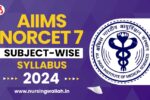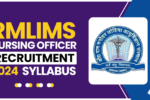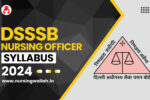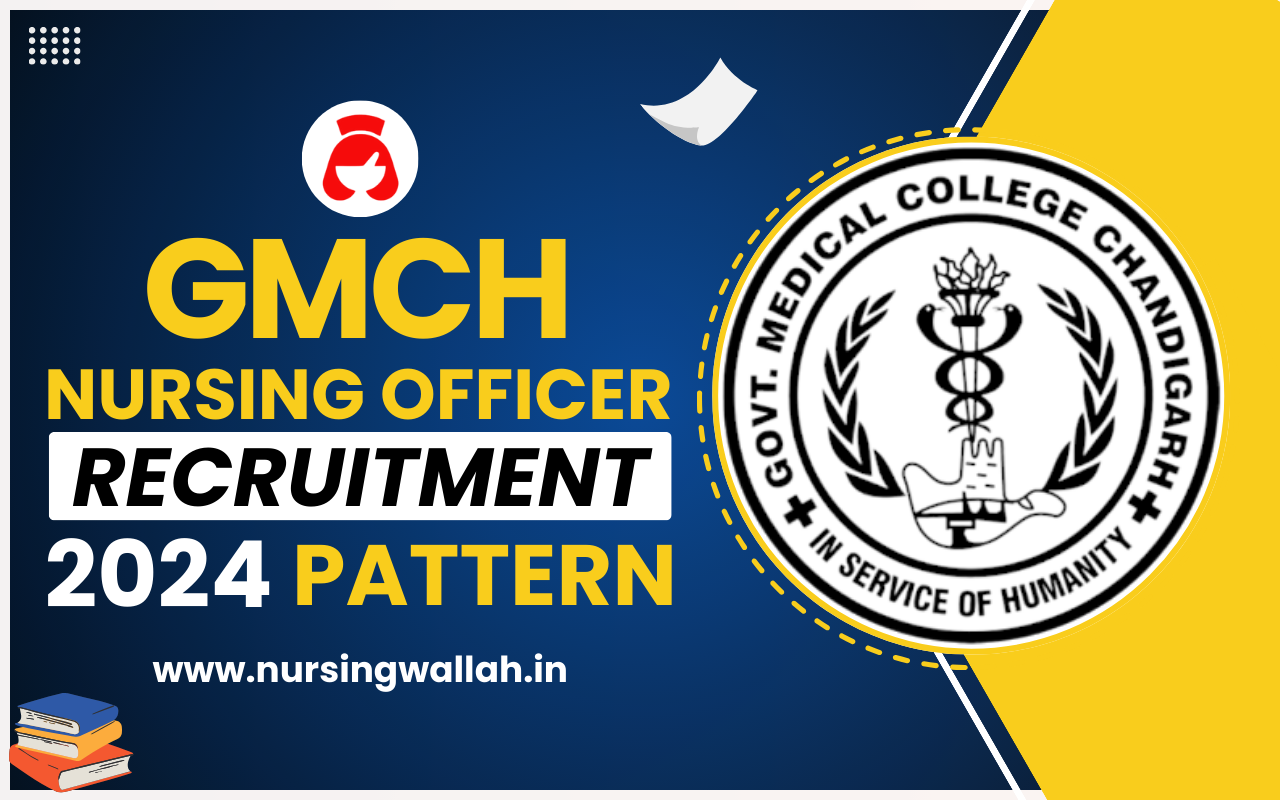JIPMER Nursing Officer Syllabus 2024: Preparing for the JIPMER Nursing Officer exam can feel overwhelming. The syllabus is vast, and the competition is fierce. But, you can manage it by breaking down the exam into smaller parts. Focusing on self-care during your preparation journey is also important. This will help you feel more in control and confident in your abilities.
In this blog post, we will explore the JIPMER Nursing Officer 2024 exam pattern and syllabus. We will provide tips on how to approach each section strategically. Balancing study with rest is crucial.
Our goal is to help you understand what to expect. This way, you can design a preparation plan that suits your strengths and needs. Remember why you chose this career path. Your purpose is to help and heal others. Let that drive you when challenges arise.
JIPMER Nursing Officer Syllabus Overview
The Jawaharlal Institute Of Postgraduate Medical Education & Research (JIPMER) has announced the official syllabus and exam pattern for the JIPMER Nursing Officer online test. The selection process will include an online exam followed by a skill test.
The JIPMER Nursing Officer Syllabus 2024 covers General Nursing, Numerical Aptitude, and General English. Candidates must carefully review the syllabus for the online exam. It is a key part of their preparation.

To exceed the JIPMER Nursing Officer Cut-Off marks, candidates need a thorough understanding of the syllabus and exam pattern. This article is a useful resource for those preparing for the online test. For more details on the JIPMER Nursing Officer Exam Pattern & Syllabus, please read on.
Also Read: JIPMER Nursing Officer Recruitment 2024
JIPMER Nursing Officer Syllabus 2024
The JIPMER Nursing Officer examination is crucial for candidates aspiring to join the esteemed Jawaharlal Institute Of Postgraduate Medical Education & Research. Understanding the syllabus is imperative. It guides candidates in their preparation journey. Let’s delve deeper into the comprehensive JIPMER Exam syllabus.
The JIPMER Exam syllabus is detailed and covers various subjects. Candidates must focus on each section. This will help them score well and secure a good rank. Knowing the syllabus thoroughly can make a big difference.
The syllabus includes topics from medical and nursing fields. It tests the candidate’s knowledge and skills. This ensures they are well-prepared for the job. Proper preparation is key to success.
To help you with your preparation, we have broken down the syllabus. This will make it easier to understand. Focus on one topic at a time. This approach will help you manage your study time effectively.
General Nursing & Midwifery
- Human Anatomy and Physiology: Understanding the structure and function of the human body systems.
- Nursing Management: Principles and practices related to effective nursing management.
- Toxicology & First Aid: Basics of managing poisonings and immediate care techniques.
- Clinical Pathology: Study of disease processes and diagnostic procedures.
- Drug Store Management & Pharmacology: Management of drugs in a healthcare setting and study of drug interactions and effects.
- Psychiatric Nursing: Care and management of patients with mental health disorders.
- Microbiology: Study of microorganisms and their relevance in healthcare settings.
- Sociology & Nutrition: Understanding societal aspects and the role of nutrition in patient care.
- Pediatrics & Mental Health: Care of children and management of mental health disorders.
- Health Education, Communication Skills & Psychology: Effective communication in healthcare, patient education, and basic psychology concepts relevant to patient care.
General English
- Vocabulary & Grammar: Synonyms, antonyms, homonyms, direct and indirect speech, sentence completion, improvement, idioms, phrases, and spelling tests.
- Comprehension & Verbal Ability: Reading comprehension, active-passive voice, spotting errors, theme detection, and transformation of sentences.
- Synonym: These are words that have similar meanings to other words. For instance, “happy” is a synonym for “joyful.”
- Antonyms: These are words that have opposite meanings. For example, “happy” is an antonym of “sad.”
- Direct Speech: It refers to when you quote the exact words spoken by a person. For example, She said, “I am going to the market.”
- Indirect Speech: It conveys the same message without using the exact words. The sentence would be: She said she was going to the market.
- Sentence Completion: This involves completing a sentence with the appropriate word or phrase that fits contextually and grammatically.
- Sentence Improvement: This tests your ability to recognize errors or areas of improvement in a given sentence and choose the correct alternative.
- Spelling Test: This assesses your ability to spell words correctly. You might be given a word or asked to choose the correct spelling among several options.
- Spotting Errors: In this section, a sentence is given, and you’re required to identify if there’s any grammatical or structural error in it.
- Theme Detection: This involves understanding the central idea or theme of a passage or paragraph. It tests your ability to grasp the primary message or intention behind a given text.
- Active Voice: The subject of the sentence acts. Example: “She writes a letter.”
- Passive Voice: The subject receives the action. Using the above example, in passive voice, it becomes: “A letter is written by her.”
- Vocabulary Test: This evaluates your vocabulary knowledge, including understanding the meaning of words, their synonyms, antonyms, and sentence usage.
- Transformation: This tests your ability to change the form of a sentence without changing its meaning, such as converting an assertive sentence to an interrogative or vice versa.
- Reading Comprehension: This assesses your ability to understand and interpret a given passage or text. Questions might be based on the passage’s main idea, details, inferences, or vocabulary.

Numerical Aptitude
- Mathematical Concepts: Percentage, average, mensuration, quadratic and simple equations, pipes and cisterns, probability, ratios, proportions, areas, time-distance, simplifications, permutations, combinations, LCM, HCF, and compound interest.
- Percentage: This topic deals with expressing a number as a fraction of 100.
- Average: Average, or mean, is the sum of a set of numbers divided by the count of numbers in that set. It’s essential for understanding typical values in a dataset.
- Pipes and Cistern: This topic focuses on problems related to pipes filling or emptying cisterns (containers). Such issues typically involve calculating the time taken to fill or empty a cistern when given the rate of inflow or outflow.
- Probability: Probability deals with the likelihood of an event occurring. It involves understanding concepts like sample space, favorable outcomes, and calculating probabilities using formulas.
- Ratio and Proportion: The ratio represents the quantitative relationship between two or more numbers. Proportion refers to the equality of two ratios. Understanding ratios and proportions is essential for solving various mathematical problems related to mixtures, proportions, and comparisons.
- Simplification and Approximation: This focuses on simplifying complex mathematical expressions by performing various arithmetic operations. Approximation involves finding values close to the actual value, usually done to make calculations more manageable.
- Permutations and Combinations: Permutations deal with the arrangement of objects, while combinations focus on the selection of objects without considering their order. These concepts are crucial for counting principles and probability calculations.
- LCM and HCF: LCM (Least Common Multiple) is the smallest multiple common to two or more numbers, while HCF (Highest Common Factor) is the largest number that divides two or more numbers without leaving a remainder. These concepts are fundamental in various mathematical operations and problem-solving.
- Compound Interest: Compound interest involves calculating interest on the initial principal and the accumulated interest from previous periods. This concept is essential for understanding investments, loans, and savings over time.
Reasoning
- Logical & Analytical Reasoning: Non-verbal reasoning, puzzles, logical reasoning, verbal reasoning, analytical reasoning, data sufficiency, and data interpretation to assess logical thinking and problem-solving skills.
- Non-Verbal Reasoning: Non-verbal reasoning involves solving problems and recognizing patterns without using words. This can include understanding sequences, analogies, classifications, series, and spatial reasoning using shapes, figures, patterns, and diagrams.
- Puzzles: Puzzles in reasoning refer to problems that require logical thinking and deduction. This could involve arranging items in a specific order, deciphering codes, or solving intricate logical problems presented as puzzles.
- Logical Reasoning: Logical reasoning involves assessing statements and determining whether they are true or false based on given information. It also includes drawing conclusions from premises or determining the validity of arguments based on logic.
- Verbal Reasoning: Verbal reasoning focuses on assessing the ability to think constructively and logically using words. This might involve understanding and analyzing written information, concluding written passages, or identifying relationships between concepts or words.
- Analytical Reasoning: Analytical reasoning emphasizes evaluating complex situations, patterns, or problems and breaking them down into smaller components or logical steps to understand them better. It involves assessing information critically and drawing logical conclusions based on evidence and reasoning.
- Data Sufficiency: Data Sufficiency involves determining whether the provided information is sufficient to answer a question. Candidates must evaluate the given data and decide if it provides adequate information to solve the problem without additional details.

General Awareness and Current Affairs
- National & International Knowledge: States, capitals, famous personalities, art, culture, geography, economics, daily news, sports, politics, countries, currencies, scientific research, and other topics are covered in the JIPMER Nursing Officer Syllabus 2024.
- States and Capitals: This topic covers knowledge about the various states in a particular country and their respective capitals. Understanding this helps grasp a nation’s geographical layout and administrative divisions.
- Economic State: This segment covers information about the economic conditions, trends, policies, and developments of a nation or region. It encompasses topics related to fiscal policies, economic indicators, growth rates, industries, and economic reforms.
- Daily News: Daily News refers to current events, incidents, developments, and happenings that are of significance and have been reported recently in the news. Staying updated with daily news helps understand the ongoing events and their implications.
- Sports and Games: Sports and Games topics include knowledge about various sports, athletes, tournaments, championships, rules, achievements, records, and significant events related to sports and games globally or nationally.
- General Polity: General Polity focuses on understanding a country’s political system, governance, constitution, laws, rights, duties, institutions, and structures. It covers democracy, governance, judiciary, executive, legislature, and administrative aspects.
- Countries and Currencies: This section provides information about different countries and their respective currencies. It helps understand the global economic landscape, international trade, and financial systems.
- Scientific Research: Scientific Research topics involve advancements, discoveries, innovations, technologies, developments, and contributions in various fields of science and technology. It covers research findings, scientific breakthroughs, and technological advancements.
- National and International Affairs: National and International Affairs encompass significant events, developments, issues, agreements, treaties, conflicts, partnerships, and relations at both national and international levels. It provides insights into global affairs, diplomatic relations, international organizations, and geopolitical developments.
JIPMER Nursing Officer Exam Pattern
The exam pattern for the JIPMER Nursing Officer exam plays a crucial role in a candidate’s performance. Understanding the marking scheme is vital for answering questions accurately. It also helps in gauging potential scores once the official answer key is out. Knowing the exam pattern provides insights into the weightage of each section. This knowledge allows candidates to strategize their responses effectively. By understanding the structure, candidates can allocate their time and effort wisely. This improves their chances of scoring higher marks. Overall, being familiar with the exam pattern is essential for success in the JIPMER Nursing Officer exam.
| JIPMER Nursing Officer Exam Pattern | |||||
| S.no. | Subject | Weightage | No. of Questions | Marks | Duration |
| 1. | The related subject concerned | 70% |
100 |
400 |
1 hour and 30 Minutes |
| 30% | |||||
| 2. | General areas like General Knowledge, General English, and General Mathematics | ||||
| Total | 100% | 100 | 400 | ||
Computer-Based Test Overview
- The examination consists of 100 questions. Each question carries 4 marks.
- The total score for the exam is 400 marks.
- There is a penalty for incorrect answers. You will lose 1 mark for each wrong response.
- Candidates have 90 minutes to finish the exam. This is equal to 1 hour and 30 minutes.
Skill Assessment
The skill assessment is the final stage of the JIPMER Nursing Officer selection process. Only candidates who pass the online exam will move to this stage. During this assessment, candidates must show they can use medical equipment. They will also perform standard medical procedures. This phase tests their practical skills in a real-world setting.

JIPMER Nursing Officer Syllabus – Preparation Tips
Preparing for the JIPMER Nursing Officer exam requires careful planning and strategy. To ensure you cover the syllabus thoroughly and perform well on exam day, follow these useful tips:
- Review the Syllabus: Start by examining the official JIPMER Nursing Officer syllabus. This will help you understand what topics and subjects you need to study.
- Create a Study Plan: Make a structured study plan. Allocate specific times for each topic and prioritize based on what you find easier or harder.
- Gather Study Materials: Collect all necessary study materials. Use textbooks, past exam papers, and online resources that align with the syllabus.
- Focus on Key Subjects: Spend more time on important subjects like General Nursing, Numerical Aptitude, General English, and other core areas. Ensure you grasp the basic concepts well.
- Practice Regularly: Regular practice is crucial. Work on sample papers, take mock tests, and solve previous years’ questions to enhance your time management and problem-solving skills.
- Revise Often: Set aside time for frequent revisions. Revisiting topics helps solidify your knowledge and improves retention.
- Stay Updated: Keep an eye on any changes to the syllabus or exam pattern. Subscribe to official notifications and regularly check the JIPMER website for updates.
- Stay Positive and Confident: Maintain a positive mindset and stay calm. Avoid last-minute studying and trust in your preparation strategy.
By following these steps, you can ensure a well-rounded preparation for the JIPMER Nursing Officer exam.
JIPMER Nursing Officer Exam 2024: Books for Preparation
To ensure that you cover all the essential topics in your syllabus effectively, it’s important to refer to the best books available. These books, written by renowned subject experts, will help you grasp the material more efficiently. For JIPMER Nursing Officer preparation, the following books are highly recommended:
| S.no. | Subject | Book | Author/Publisher |
| 1 | General Nursing & Midwifery | General Nursing and Midwifery | Nisha Clement |
| 2 | General English | Objective General English | S.P. Bakshi |
| 3 | Reasoning | A Modern Approach To Verbal & Non-Verbal Reasoning | S. Chand |
| 4 | Numerical Ability | Quantitative Aptitude | R. S. Aggarwal |
| 5. | General Awareness and Current Affairs | General Knowledge 2022 | Arihant Pandey |
These books cover various subjects comprehensively. They are designed to help you understand and master each topic. Make sure to include them in your study plan to maximize your preparation and increase your chances of success.
If you want daily nursing job alerts and nursing job-related updates, then join our Telegram channel and WhatsApp channel today to stay informed about the latest opportunities and developments in the nursing field.









